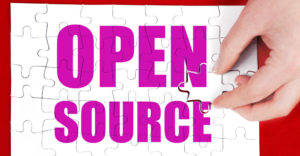The passing of Steve Jobs earlier this month triggered reactions that spanned the gamut — from expressions of appreciation and sober reflection to some tasteless extremes of zealotry from a subset of the open-source community.
We can learn a lot from Steve Jobs, even if we ultimately have different goals.
‘Make Love, not War’
Back in 1997, Steve Jobs made it clear that the way to go forward was not to continue with the “Apple vs. Microsoft” mentality but to concentrate on what made Apple uniquely Apple. As long as Apple was locked into direct competition with Microsoft, it yielded the home-field advantage. Apple products would be judged by their compatibility with Microsoft products rather than on their own virtues and flaws. Saying, “Apple is as good as Microsoft for doing X, Y, and Z,” implied that Microsoft was the gold standard.
Jobs recognized this as a strategic mistake — and one that could not be overcome unless the thinking that led to it was exorcised. He made it clear that Apple should be competing with Apple, focusing on Apple’s strengths rather than on what the competition was doing.
The end result, almost 15 years later, is that Microsoft’s leadership is obsessed with what Apple is doing, and Apple is not just back from the brink of bankruptcy but also the most valuable company in the world.
Apple got where it is today through its leadership, from Jobs down, changing the “rules of engagement.” No longer was it a war between rivals, but a focus on seducing the customer. Their mission: Figure out the next thing the customer wants before they’re aware of it, trust that they’ll recognize it when they see it, and wow them with how clean-looking and easy it is to use. Make computers and devices that are so seductive they’re almost sexy.
The end result might be summed up as “don’t make it look or work like a Microsoft product,” but that would be a mistake. You don’t get products like the iMac, iPod, iPhone, and iPad by simply trying to be different from your competition — that route gives you products that are just as clunky but in a different way. Difference for the sake of difference rarely works out.
Yet, isn’t that what so much open source has been accused of doing all these years, rather than focusing on its core strength as a solid piece of infrastructure that can be infinitely customized? Worse, it also has a history of actively demonizing for-profit companies as the enemy rather than regarding them as legitimate competitors that should be courted to produce ports of commercial products, such as games, to run on open systems — thus growing both interest and user base.
Marketing’s Top Priority
Apple’s design decisions have focused with laser precision on taking the end-user to the next step. Most recently, it was “Flash will kill the battery life of the iPad and opens too many holes.” So Flash on the iPad was out.
Similarly, the original iPhone didn’t come with an App Store. The idea was that Apple partners would be the only ones to be “blessed” with the ability to write real applications for the iPhone. Everyone else was to be restricted to “Web apps.”
It was only after people started jailbreaking their iPhones to add their own apps that Jobs saw that consumers wanted more than “Web apps” and reversed his stand against an App Store. Developers scream that Apple has too much control over the App Store, but customers depend on the fact that apps are prescreened — and that they can always complain to Apple instead of some unknown developer.
The takeaway is that Jobs didn’t just listen to customers — he also learned from what they did and capitalized on it. Giving people what they want in exchange for their money gives both sides a win-win feeling. His message for developers was the same — for those who weren’t shouting so loudly that their “rights” had been infringed.
The sort of end-to-end control that Apple exercises rubs many in the Free/Libre Open Source Software community the wrong way. However, when F/LOSS proponents criticize this, we ignore one fact — the customer is always right. They have the absolute right to give their business to whomever they choose, and rants of “you’re trading away your freedom” are counterproductive. We also miss the point that the customer is trying to teach us — that it’s about the applications themselves, not any philosophical arguments over the merits of open source vs. proprietary programs or the operating system’s look and feel.
Find Out What They Really Want. Show Them How to Get It
When Henry Ford first started producing cheap cars, automobiles were expensive luxury items, handcrafted one at a time. People said there was no market for a cheap car. As Ford said, “If I had asked my customers what they wanted, they would have said a faster horse.”
Similarly, asking people what sort of computer or operating system they want will mostly get them something similar to what they have today — just faster, cheaper, or with more storage. Not very imaginative, but then again, it takes considerable resources to bring out something truly different.
By the same token, most open-source projects aren’t showing much in the way of innovation because the financial model doesn’t allow for adequate independent funding of research and development. This is one reason the open source ecosystem is littered with poorly iterated work-alikes; the other is the antagonism inside the F/LOSS movement toward producers of proprietary software — the ones who have a financial stake in driving innovation.
We Can’t Show Them How to Get It
Most of us have had the experience of switching someone to Linux, only to see their initial enthusiasm turn into frustration as they keep running into usability factors — the greatest one being that they can’t run their favorite programs. Users simply won’t accept a cheap knock-off, not even for free. The “freedom” of a F/LOSS computer quickly becomes a millstone, and eventually, they either ask us to reinstall their old operating system or, if we’ve been particularly obnoxious in advocating for F/LOSS, they just quietly buy a new computer.
We know what people want to do — run the programs of their choice. We just can’t show them how to do it because we’re too busy fiddling with the less unimportant parts, like trying to make a desktop environment that looks more like a Mac.
It would be far more constructive to strike up a working relationship with the producers of proprietary programs to help them get onto open platforms. Unfortunately, admitting that proprietary programs have their place is something that some people just can’t do. Their zealotry blinds them and makes them focus on the competition from proprietary software instead of looking at the end-user. Earlier this month, we saw a public example of how this attitude can turn ugly.

















































"It would be far more constructive to strike up a working relationship with the producers of proprietary programs to help them get onto open platforms. Unfortunately, admitting that proprietary programs have their place is something that some people just can’t do. Their zealotry blinds them, and makes them focus on the competition from proprietary software instead of looking at the end-user."
The WINE project has a set of scripts you can can run on the source to improve compatibility with wine, and a few people to target WINE as a platform.
The two major problems are marketshare and middleware. A lot a middleware does not run on Linux (but more than has in the past), and if you’re already a big player it doesn’t make a whole lot of sense to support open source platform s. The exception is server software where open source is the big player.
For innovation check out the enlightenment desktop, which does some pretty cool things like profile switches, and the ability to scale to almost any screen size.
Now while there can be a general usability issue there are people out the working on it.
openusability.org/
Bottom line there are people working on it and every week it’s getting better for everybody.
Did you catch it? Here I’ll capitalize it for you…THE WINE PROJECT…right there is an EPIC fail. While I’ll give the Wine guys an E for effort its still a CLI heavy fiddly little beast that frankly is about as user friendly as handing a buzzsaw to a blind man.
A wise poster on another site said something to someone screaming "Linux is ready!" that frankly i think should be looked upon as the gold standard for cutting to the heart of the matter. he said "can someone with median computer knowledge sit in a room by themselves without internet access and get through a normal day? How about first-time setup? If not, it’s not ready and it’s a powertool."
And THAT, that right there, is the key. Without google, without badly written man pages, can you stick the average user in front of a blank box and have them come away able to work? you can with windows 7, i know this is true because i left my dad’s new PC with his new Win 7 HP disc and told him I’d be out at the end of the week to install it. well being impulsive and more than a little impatient he decided "Well if I screw it up he can just come FIX it on the weekend" but you know what? there was NOTHING to fix, not one. I had to show him where to get FF and that was it. it downloaded ALL the drivers and set them up, even pointed him to a page with free and pay AVs for him to choose from.
And THAT is what you should strive for, not trying to be a bad windows clone. Frankly people have never been more net-centric in history, the world lives in FB and plays farmville. But you gotta let go of the geeker "CLI make me leet!" craziness and accept little Suzy the checkout girl doesn’t go home and read programming books in the bathtub okay? if you can’t hand the average person on the street a blank laptop and a copy of your OS and have them be able to have it up and running with ZERO help then you’re not ready and need to fix it PERIOD.
you are about to be given two gifts Linux guys, Win 8 is gonna bomb and tons of good hardware worth billions is gonna be EOLed by MSFT with the death of XP. you COULD gain great share but you have to WANT IT. you can’t expect the world to start learning bash scripting and reading programming books, accept this and give them what they want as barb said or give up and just be the geeker OS, your choice.
First, a disclaimer: I have never owned an Apple device, and I use linux as my day-to-day desktop. My only use of Windows is for compatibility testing and printing with what was (according to the box) supposed to be a linux-compatible printer, or for wifi (broken yet again by another update).
I think that the "Window of opportunity" (pardon the pun) for Linux was Vista. If people don’t like Win8, they’ll just continue to run Vista (which is now more stable than many Linux desktop environments) or Win7 and wait for Win9, or move on to OSX.
I too was anticipating the "XP is going to EOL billions of dollars of hardware" as a chance to recoup, but I now think it’s not going to happen, for several reasons.
1. New hardware is CHEAP!
2. Most of those old systems are already being supplanted by combinations of tablets, pads, and smartphones.
Those old systems, with their old hardware, are going to be more expensive to upgrade than to just junk. Outdated (and expensive to upgrade) ram, PATA hard drives, motherboards and cpus that just don’t cut it today, inefficient and noisy power supplies, lousy (by today’s standards) video … even going the "Oh well, we can always use it as a server" route, you’d mostly be better served just junking it and buying something new, just from an energy standpoint.
The only real market opportunity that I see at this point is finally porting all those old IE6 web apps. I think Microsoft has (most likely inadvertently) anticipated this by making their MetroUI html5+javascript-centric.
Bypassing the browser is also something that Apple and the various Linux desktops should be putting more work into. We can already do this to a certain extent in three ways – KDE allows for using web snippets (but it’s buggy) and both Java and Flash allow programmers to write code that leverages html, css, and interactions with servers (oops, I forgot, it’s now "Teh Cloudz!"), and if you really want to go to all that work, you can always "write your own implementation" from scratch using the technology of your choice.
Apps were a first step for many users in moving away from "in a browser" for net-centric applications other than email … I fully expect the trend to continue, if only because it’s simpler for the end user, and making things simpler for the end user means that they can concentrate on what they want to do, rather than how to do it.
If the various linux desktops don’t do it, and do it properly, I expect to see them subsumed by Android on the desktop/laptop in 5 years.
They actually delivered.
Underperforming? One of my daughters has replaced her computer with an iPhone. That’s not under-performing – that’s disrupting the market!
It’s been about half a year, and the end result is, if she ever feels she needs another computer, she’s going to buy a Mac. Or an iPad. She’s tried Windows, she’s tried Linux, and she certainly knows what she doesn’t want.
You’re right about open source not having the budget – that’s always been an Achilles heel, with no solution in sight. The active hostility of large segments of open source to anything that is "for profit", and refusal to learn from what works, doesn’t help matters. I call them the "Open source for closed minds" camp, for obvious reasons.
Most people learn from their mistakes. Smart people learn from other people’s mistakes – and from others’ successes. We need more "smart" thinking – not in copying what they make, but in HOW they got to be so successful, because we don’t have all the answers. Instead, we have too many extremists wrt "Not Invented Here."
There’s a sentiment in the community that making things simpler equates to "dumbing down." That’s not necessarily the case, and such thinking is a symptom of false elitism. It’s also been the #1 turn-off for people trying open source. People want help, not being burned by an "RTFM or GTFO" attitude.
Rather than refusing to "dumbing down", we should look at opportunities to get out of the user’s face so they can do what they want to do, rather than bit-twiddling the underlying technology.
Another equally silly thing we need to stop doing is the removal of features that people have grown used to, for the sake of theoretical "user interface guidelines." GNOME and Ubuntu are currently probably the biggest offenders, but there’s more than enough blame to go around.
Winecfg has been graphical for ages, and wine-tricks comes with a GUI for the past year. Soon their going to put back-traces in the crash dialog so you’ll never use the CLI unless you just happen to roll that way. If you just don’t want to fiddle with settinga ever, then there is playonlinux. The bottom line is that effort has been exerted and changes are being made.
And that is how WIDE the XP market was. We are talking high end single and dual core, laptops and netbooks, a heck of a lot of VERY nice systems came with WinXP. At the shop i’m already starting to see high end P4s and Athlon X2s and Pentium Ds, not to mention all the Mobile Pentiums and Turions.
the other thing you are missing is what folks do with their PCs, which frankly would play right into FOSS if someone would just get on the ball and make a Linux that was as friendly as Win 7 or even WinXP, and that is the net. they play Farmville, they go to Facebook, they use Gmail, now what part of that needs a crazy amount of RAM or multicores even? answer NONE, heck even the build that I call the "big standard XP box" which is a 2.2Ghz-3.6Ghz P4 with 512Mb of RAM and a 40gb HDD can run that!
Finally you are missing the fact that economy is in the toilet and folks are looking to save money ANY way they can! Sure YOU may have a nice top o’ the line desktop, along with a laptop or netbook, but there are a lot of folks out there with only a single desktop that would like a second or a laptop to go with what they have. you can pick up a replacement battery for most model laptops from Amazon for around $30, which means there is a BIG market for cheap laptops! Heck here at the shop the sub $150 laptops go as fast as I can get them in!
But in the end it won’t matter as the Linux community will just scream "We’re leet!" and shoot themselves in the face. you have too many anti-social developers and trolls in positions of power that think ANYTHING that makes linux easier for the user is a betrayal of their "geek cred" like copypasta into a term suddenly makes them a hacker. it is this braindead boneheaded desire to feel superior to the masses that will leave Linux stuck in last place, simply because there isn’t a Gates or Jobs to crack the whip and deal with the trolls. while RMS may think you can create a communist utopia as we have seen on unregulated forums no direction or control ends up with nothing but trolls and malcontents running the joint.
Sadly that is what I believe is wrong with Linux and simply won’t be fixed. too many in the community look down their pimply noses at anyone who isn’t a programmer and claim Linux as their own, and sadly too many developers only care about CLI and don’t bother writing even a halfway functional GUI for their applications. if anything it has gotten worse with regards to factions and elitism and without serious direction from the top i doubt things will get better in time to make a difference. The masses will just ignore Linux because the geeks make sure to ignore the masses.
The only thing Apple did that was different was spend a lot of money on advertising shiny, underperforming gadgets to insecure customers in need of hipness validation. Open source doesn’t have the budget, it doesn’t make shiny gadgets, and its userbase is secure in its nerd place.